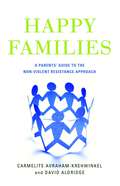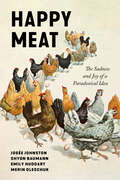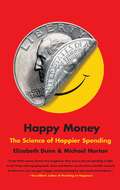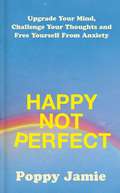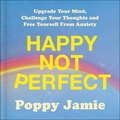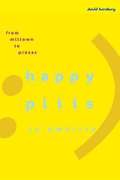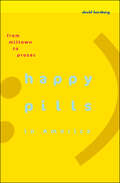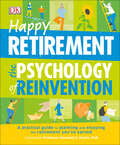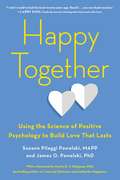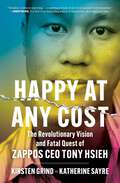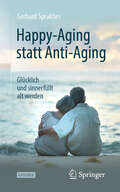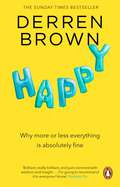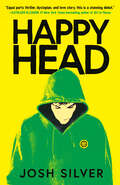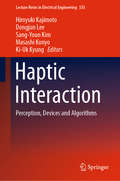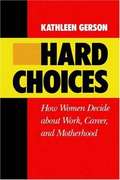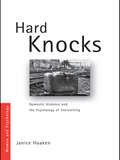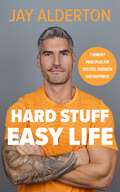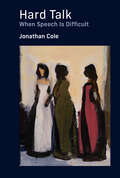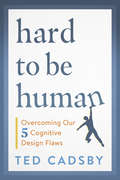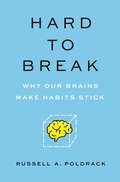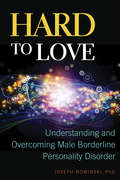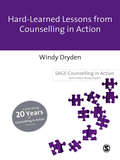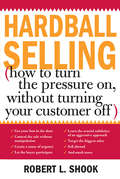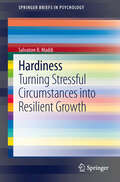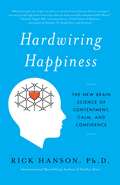- Table View
- List View
Happy Families
by David Aldridge Carmelite Avraham-KrehwinkelParenting a severely disruptive child can be exhausting and demoralizing to the point where breaking the cycle of bad behaviour seems an impossible task. Happy Families offers a realistic, step-by-step, practical approach to tackling destructive behaviour that helps parents regain control and establish harmony within the family. Using hands-on techniques based on the principles of non-violent resistance, each chapter deals with a different stage of the process - from communicating to the child an unwavering determination that the situation will change and enlisting the support of family and friends, to taking positive action in a way that avoids escalation. General advice such as how to respond constructively and consistently to provocation is included throughout, and morale-boosting tips encourage flagging parents to persevere with the approach. Happy Families will empower despairing parents and caregivers who seek to contain, counter and positively re-direct the aggression they face from children in distress, resulting in deep-felt and lasting change.
Happy Meat: The Sadness and Joy of a Paradoxical Idea (Culture and Economic Life)
by Josee Johnston Shyon Baumann Emily Huddart Kennedy Merin OleschukNorth Americans love eating meat. Despite the increased awareness of the meat industry's harms–violence against animals, health problems, and associations with environmental degradation–the rate of meat eating hasn't changed significantly in recent years. Instead, what has emerged is an uncomfortable paradox: a need to square one's values with the behaviors that contradict those values. Using a large-scale, multidimensional, and original dataset, Happy Meat explores the thoughts and emotions that underpin our moral decision-making in this meat paradox. Conscientious meat-eaters turn to the notion of "happy meat" to make sense of their behaviors by consuming meat they see as more healthy, ethical, and sustainable. Happy meat might be labeled grass fed, free-range, antibiotic free, naturally raised, or humane. The people who produce and consume it, together, make up the complex landscape of conscientious meat-eating in modern Western societies. The discourse of happy meat ultimately may not be a sufficient response to all the critiques of meat eating, rife as it is with contradictions. However, it offers a powerful case for understanding how moral boundaries and notions of the 'good eater' are constructed through negotiations of values, identity, and status.
Happy Money: The Science of Happier Spending
by Michael Norton Elizabeth DunnTwo professors combine their fascinating and cutting-edge research in behavioral science to explain how money can buy happiness--if you follow five core principles of smart spending.Most people recognize that they need professional advice on how to earn, save, and invest their money. When it comes to spending that money, most people just follow their intuitions. But scientific research shows that those intuitions are often wrong.Happy Money offers a tour of research on the science of spending, explaining how you can get more happiness for your money. Authors Elizabeth Dunn and Michael Norton have outlined five principles--from choosing experiences over stuff to spending money on others--to guide not only individuals looking for financial security, but also companies seeking to create happier employees and provide "happier products" to their customers. Dunn and Norton show how companies from Google to Pepsi to Charmin have put these ideas into action.Along the way, Dunn and Norton explore fascinating research that reveals that luxury cars often provide no more pleasure than economy models, that commercials can actually enhance the enjoyment of watching television, and that residents of many cities frequently miss out on inexpensive pleasures in their hometowns. By the end of this "lively and engaging book" (Dan Gilbert, author of Stumbling on Happiness), you'll be asking yourself one simple question every time you reach for your wallet: Am I getting the biggest happiness bang for my buck?
Happy Not Perfect: Upgrade Your Mind, Challenge Your Thoughts and Free Yourself From Anxiety
by Poppy JamieEven before the pandemic brought on a crushing wave of stress, anxiety, isolation and financial struggle, there was a growing mental health crisis - exacerbated by a digital-first culture that is putting untold pressure on a generation of young people. Poppy Jamie has made it her life's mission to do something about this and share the actionable, science-backed solutions we can all use to rewire our daily thoughts and break damaging patterns for good - those same ones that she used to piece herself back together after suffering from chronic anxiety and burnout. Happy Not Perfect, the book, sets out her 'Four-Step Flex Framework' that will enable readers to bend and stretch their negative thought pathways into better shape, unravel their emotional blockages, raise their energy levels, move through challenges with confidence and create a life aligned with their deepest values and aspirations. Blending cutting-edge science from the world's leading experts, straight-talking spirituality and the very soul of Poppy's own experiences. She is an author who's been there and wants to equip us with the tools, knowledge and methods we can use to navigate our hardest days, become adaptable, re-write old habits and fears and snap us out of autopilot, to start building a brighter future. *Poppy says 'The Flex is about committing to compassionate action to change our realities. Life will never be perfect, and our happiness lies in the beautiful acceptance of that. This book is about digging deeper into our psyche to heal the root of our thinking and as we all carry emotional wounds, micro or macro, taking the time to understand the root of the stories we tell ourselves, is essential in rewriting new scripts moving forward.*"Poppy is one of my favourite voices in the world, always in pursuit of understanding, information, and empathy." - Jameela Jamil *"For the past four years Poppy has been campaigning for better mental well-being education and accessible tools - she is inspirational and makes complex problems easy to understand." - Suki Waterhouse
Happy Not Perfect: Upgrade Your Mind, Challenge Your Thoughts and Free Yourself From Anxiety
by Poppy JamieFusing the very best of self help, science and spirituality, Happy Not Perfect teaches us how to SHIFT our emotional wellbeing into a happier, balanced and less anxious state.Even before the pandemic brought on a crushing wave of stress, anxiety, isolation and financial struggle, there was a growing mental health crisis - exacerbated by a digital-first culture that is putting untold pressure on a generation of young people. Poppy Jamie has made it her life's mission to do something about this and share the actionable, science-backed solutions we can all use to rewire our daily thoughts and break damaging patterns for good - those same ones that she used to piece herself back together after suffering from chronic anxiety and burnout. Happy Not Perfect, the book, sets out her 'Four-Step Flex Framework' that will enable readers to bend and stretch their negative thought pathways into better shape, unravel their emotional blockages, raise their energy levels, move through challenges with confidence and create a life aligned with their deepest values and aspirations. Blending cutting-edge science from the world's leading experts, straight-talking spirituality and the very soul of Poppy's own experiences. She is an author who's been there and wants to equip us with the tools, knowledge and methods we can use to navigate our hardest days, become adaptable, re-write old habits and fears and snap us out of autopilot, to start building a brighter future. *Poppy says 'The Flex is about committing to compassionate action to change our realities. Life will never be perfect, and our happiness lies in the beautiful acceptance of that. This book is about digging deeper into our psyche to heal the root of our thinking and as we all carry emotional wounds, micro or macro, taking the time to understand the root of the stories we tell ourselves, is essential in rewriting new scripts moving forward.*"Poppy is one of my favourite voices in the world, always in pursuit of understanding, information, and empathy." - Jameela Jamil *"For the past four years Poppy has been campaigning for better mental well-being education and accessible tools - she is inspirational and makes complex problems easy to understand." - Suki Waterhouse(P) 2021 Hodder & Stoughton Ltd
Happy Pills In America: From Miltown To Prozac
by David HerzbergValium. Paxil. Prozac. Prescribed by the millions each year, these medications have been hailed as wonder drugs and vilified as numbing and addictive crutches. Where did this "blockbuster drug" phenomenon come from? What factors led to the mass acceptance of tranquilizers and antidepressants? And how has their widespread use affected American culture? David Herzberg addresses these questions by tracing the rise of psychiatric medicines, from Miltown in the 1950s to Valium in the 1970s to Prozac in the 1990s. The result is more than a story of doctors and patients. From bare-knuckled marketing campaigns to political activism by feminists and antidrug warriors, the fate of psychopharmacology has been intimately wrapped up in the broader currents of modern American history. Beginning with the emergence of a medical marketplace for psychoactive drugs in the postwar consumer culture, Herzberg traces how "happy pills" became embroiled in Cold War gender battles and the explosive politics of the "war against drugs"—and how feminists brought the two issues together in a dramatic campaign against Valium addiction in the 1970s. A final look at antidepressants shows that even the Prozac phenomenon owed as much to commerce and culture as to scientific wizardry. With a barrage of "ask your doctor about" advertisements competing for attention with shocking news of drug company malfeasance, Happy Pills is an invaluable look at how the commercialization of medicine has transformed American culture since the end of World War II.
Happy Pills in America: From Miltown to Prozac
by David HerzbergValium. Paxil. Prozac. Prescribed by the millions each year, these medications have been hailed as wonder drugs and vilified as numbing and addictive crutches. Where did this "blockbuster drug" phenomenon come from? What factors led to the mass acceptance of tranquilizers and antidepressants? And how has their widespread use affected American culture? David Herzberg addresses these questions by tracing the rise of psychiatric medicines, from Miltown in the 1950s to Valium in the 1970s to Prozac in the 1990s. The result is more than a story of doctors and patients. From bare-knuckled marketing campaigns to political activism by feminists and antidrug warriors, the fate of psychopharmacology has been intimately wrapped up in the broader currents of modern American history. Beginning with the emergence of a medical marketplace for psychoactive drugs in the postwar consumer culture, Herzberg traces how "happy pills" became embroiled in Cold War gender battles and the explosive politics of the "war against drugs"—and how feminists brought the two issues together in a dramatic campaign against Valium addiction in the 1970s. A final look at antidepressants shows that even the Prozac phenomenon owed as much to commerce and culture as to scientific wizardry.With a barrage of "ask your doctor about" advertisements competing for attention with shocking news of drug company malfeasance, Happy Pills is an invaluable look at how the commercialization of medicine has transformed American culture since the end of World War II.
Happy Retirement: A Practical Guide to Planning and Enjoying the Retirement You’ve Earned
by DKA practical, fully illustrated guide to planning and enjoying retirement, grounded in psychological research.Retirement can bring immense fulfillment but also can be a source of stress, especially today. Retirement: The Psychology of Reinvention uses psychological research and a unique visual style of infographics and illustrations to provide readers with a retirement roadmap just right for them.Fully illustrated, with constructive advice for all retirees — whatever the age and circumstances — and inspirational guidance from a wealth of sources, Retirement: The Psychology of Reinvention answers all the questions readers are likely to ask at any stage of retirement.
Happy Together: Using the Science of Positive Psychology to Build Love That Lasts
by Suzann Pileggi Pawelski James O. PawelskiHow do you get to “happily ever after”? In fairy tales, lasting love just happens. But in real life, healthy habits are what build happiness over the long haul. Happy Together, written by positive psychology experts and husband-and-wife team Suzann Pileggi Pawelski and James O. Pawelski, is the first book on using the principles of positive psychology to create thriving romantic relationships. Combining extensive scientific research and real-life examples, this book will help you find and feed the good in yourself and your partner. You will learn to develop key habits for building and sustaining long-term love by: • Promoting a healthy passion • Prioritizing positive emotions • Mindfully savoring experiences together • Seeking out strengths in each other Through easy-to-follow methods and fun exercises, you’ll learn to strengthen your partnership, whether you’re looking to start a relationship off on the right foot, weather difficult times, reignite passion, or transform a good marriage into a great one.
Happy at Any Cost: The Revolutionary Vision and Fatal Quest of Zappos CEO Tony Hsieh
by Kirsten Grind Katherine SayreFrom award-winning Wall Street Journal reporters, &“a startling portrait of one of our greatest tech visionaries, Zappos CEO Tony Hsieh&” (Robert Kolker, author of Hidden Valley Road), reporting on his short life and untimely death and what they mean for our culture&’s pursuit of happiness.Tony Hsieh—CEO of Zappos, Las Vegas developer, and all-around beloved entrepreneur—was famous for spreading happiness. He lived and breathed this philosophy, instilling an ethos of joy at his company and outlining his vision for a better workplace in his New York Times bestseller Delivering Happiness. He promoted a workplace where bosses treated employees like family members, where stress was replaced by playfulness, and where hierarchies were replaced with equality and collaboration. His outlook shaped Silicon Valley and the larger business world. Hsieh used his position at work to integrate levity into a normally competitive environment. He aspired to build his own utopian cities, pouring millions of dollars into real estate and small businesses, first in downtown Las Vegas, Nevada—where Zappos was headquartered—and then in Park City, Utah. He gave generously to his employees and close friends, including throwing infamous Zappos parties and organizing gatherings at his home, an Airstream trailer park. When Hsieh died suddenly in November of 2020, the news shook the business and tech world. Wall Street Journal reporters Kirsten Grind and Katherine Sayre quickly realized the importance of the story because of Hsieh&’s stature in the industry, but as they dug into the details of his final months, they realized there was a bigger story to tell. They found that Hsieh&’s obsession with happiness masked his darker struggles with addiction, mental health, and loneliness. In the last year of his life, he spiraled out of control, cycling out of rehab and into the waiting arms of friends who enabled his worst behavior, even as he bankrolled them from his billion-dollar fortune. Happy at Any Cost sheds light on one of the most venerated, yet vulnerable, business leaders of our time. It's about our culture&’s intense need to find &“happiness&” at all costs, our misguided worship of entrepreneurs, the stigmas still surrounding mental health, and how the trappings of fame can mask all types of deeper problems. In turn, it reveals how we conceptualize success—and define happiness—in our modern age.
Happy-Aging statt Anti-Aging: Glücklich und sinnerfüllt alt werden
by Gerhard SpraktiesWie wird man glücklich und sinnerfüllt alt? In diesem Ratgeber erfahren Sie, wie Sinnfindung im Alter gelingen kann: Wie trägt Sinn zum Glücklichsein bei? Welche Rolle spielen Werte für die Sinnfindung im Alter? Wie können wir Sinnkrisen im Alter (wie z.B. Einsamkeit, Leiden, einer Demenzerkrankung oder Depression) begegnen, und welche positiven Sinnquellen lassen sich auch im höheren Alter noch finden?Der erfahrene Altenseelsorger und Logotherapeut Gerhard Sprakties zeigt Wege auf, die vom Trübsinn zum Sinn führen. Er beschreibt anhand von Beispielen aus der Praxis und mittels vielfältiger Happy-Aging-Tipps, wie trotz der sich im Alter häufenden Verlusterfahrungen und körperlich-seelischen Beeinträchtigungen ein glückliches und sinnerfülltes Leben möglich ist.
Happy: Why More or Less Everything is Absolutely Fine
by Derren BrownThe Sunday Times Bestseller'Really brilliant and just crammed with wisdom and insight. It will genuinely make a difference to me and the way I think about myself.' Stephen Fry___Everyone says they want to be happy. But that's much more easily said than done. What does being happy actually mean? And how do you even know when you feel it?In Happy Derren Brown explores changing concepts of happiness - from the surprisingly modern wisdom of the Stoics and Epicureans in classical times right up until today, when the self-help industry has attempted to claim happiness as its own. He shows how many of self-help's suggested routes to happiness and success - such as positive thinking, self-belief and setting goals - can be disastrous to follow and, indeed, actually cause anxiety.Happy aims to reclaim happiness and to enable us to appreciate the good things in life, in all their transient glory. By taking control of the stories we tell ourselves, by remembering that 'everything's fine' even when it might not feel that way, we can allow ourselves to flourish and to live more happily.___What readers are saying: ***** 'Immensely positive and life-affirming'***** 'This is the blue print to a good life'***** 'Thought provoking and potentially life-changing.'
HappyHead (HappyHead #1)
by Josh SilverA bold new dystopian thriller about an experimental mental health retreat center for young adults where everything is not what it seems—and one boy who will risk everything to escape.Seb has been selected for a new experimental mental health center called HappyHead, designed to solve the national crisis of teenage unhappiness. There he and fellow participants will complete in a series of assessments meant to test them, so they can better face the challenges of the real world. Seb is determined to win so he can change how people see him and make his parents proud. But then Seb meets a mysterious participant named Finn who has drawn unwanted attention to himself by resisting the program&’s rules. The leaders want everyone to believe Finn is mentally unstable but as Finn exposes cracks in the system around them, Seb is left questioning the true nature of the challenges--and wondering if Finn is actually the only one he can really trust. Something sinister is at play…and as the assessments take a dark turn, it becomes impossible to ignore the voice in his head telling him that even if he wins, there might be no way out.
Haptic Interaction: Perception, Devices and Algorithms (Lecture Notes in Electrical Engineering #535)
by Hiroyuki Kajimoto Ki-Uk Kyung Masashi Konyo Dongjun Lee Sang-Youn KimThis book constitutes the proceedings of the third international conference AsiaHaptics 2018, held in Songdo, Korea. It presents the state-of-the-art of the diverse haptics (touch)-related research, including perception and illusion, development of haptics devices, and applications to a wide variety of fields such as education, medicine, telecommunication, navigation and entertainment. This book is a valuable resource not only for active haptics researchers, but also for general readers wishing to understand the status quo in this interdisciplinary area of science and technology.
Hard Choices: How Women Decide about Work, Career, and Motherhood
by Kathleen GersonHow do women choose between work and family commitments? And what are the causes, limits, and consequences of the "subtle revolution" in women's choices over the 1960s and 1970s? To answer these questions, Kathleen Gerson analyzes the experiences of a carefully selected group of middle-class and working-class women who were young adults in the 1970s. Their informative life histories reveal the emerging social forces in American society that have led today's women to face several difficult choices.
Hard Knocks: Domestic Violence and the Psychology of Storytelling (Women and Psychology)
by Janice HaakenThis book draws on interviews carried out over a period of eight years, as well as novels, films, and domestic violence literature, to explain the role of storytelling in the history of the battered women’s movement. The author shows how cultural contexts shape how stories about domestic abuse get told, and offers critical tools for bringing psychology into discussions of group dynamics in the domestic violence field. The book enlists psychoanalytic-feminist theory to analyse storytelling practices and to re-visit four areas of tension in the movement where signs of battle fatigue have been most acute. These areas include the conflicts that emerge between the battered women’s movement and the state, the complex relationship between domestic violence and other social problems, and the question of whether woman battering is a special case that differs from other forms of social violence. The volume also looks at the tensions between groups of women within the movement, and how to address differences based on race, class or other dimensions of power. Finally, the book explores the contentious issue of how to acknowledge forms of female aggression while still preserving a gender analysis of intimate partner violence. In attending to narrative dynamics in the history of domestic violence work, Hard Knocks presents a radical re-reading of the contribution of psychology to feminist interventions and activism. The book is ideal reading for scholars, activists, advocates and policy planners involved in domestic violence, and is suitable for students of psychology, social work, sociology and criminology.
Hard Stuff, Easy Life: 7 Mindset Principles for Success, Strength and Happiness
by Jay AldertonIN A WORLD WHERE COMFORT AND CONVENIENCE OFTEN RULE, DISCOVER THE 7 MINDSET PRINCIPLES THAT ARE THE SECRET TO A FULFILLING LIFE ----EVERY TRANSFORMATION STARTS FROM THE NECK UPAre you tired of never getting what you want?Is convenience preventing you from achieving your goals?Do you crave an easier, more meaningful life?An ex-military and a transformation coach, Jay Alderton reveals the game-changing truth: the secret to an easy life is conquering the hard stuff, and the hard stuff is all in your head. Because every great transformation starts from the neck up, all you need to do is learn how to crack the mindset code to make the hard stuff very easy.By breaking down the seven key mindset principles for success, strength and happiness, Hard Stuff, Easy Life will equip you with the tools to overcome any obstacle . . . 1. Happiness Is an Inside Job2. Make Peace with Your Past3. Stay True to Yourself4. Get Over What Other People Think5. Focus on the Big Picture6. Embrace Obstacles7. Stay PresentOne of the most valuable and frequently overlooked lessons of all is that about staying present in the moment. This is how you not only build a life you want, but live it to the fullest, too.Whether you're aiming to conquer personal goals, get rich and successful, or thrive in your personal life, this book is your compass and guide towards what can be your easy life of fulfilment, abundance, and jaw-dropping achievements. It’s your new revolutionary guide that will transform your life, starting from the neck up.CRACK THE MINDSET CODE AND START LIVING YOUR BEST LIFE
Hard Talk: When Speech Is Difficult
by Jonathan ColeA moving, patient-centered portrait of the social importance of speech, from a medical expert known for his humanizing explorations of health.Language comes to us through culture, environment, and family. Words embed over time, as we use our minds to comprehend them and then our mouths to say, mean, and own them. Without the ability to speak, or when talking becomes difficult, we face a challenge like few others, forced to reconnect with a world that assumes its communicators are eloquent vocally. In Hard Talk, Jonathan Cole takes a necessary look at the privilege of speech so we can better accommodate those for whom it presents problems. Cole creates space for people with a variety of conditions, including cerebral palsy, vocal cord palsy, cleft palate, Parkinson&’s, and post-stroke aphasia, to describe in their own words what the experience of difficult speech is like. No struggle is the same. Each develops along its own axis of factors—cognitive, social, and physical—that lead to unique vulnerabilities as well as extraordinary moments of adaptation and resilience. One person finds social chatter becoming more problematic than work speech. Another grows alarmed as changes in speech begin to constrain inner thoughts. Some lose the ability to find or make words though they retain awareness, while others lose self-awareness but maintain fluent speech bereft of meaning. One even loses the ability to speak with family while continuing to interact at work.Hard Talk reacquaints us with the social power of speech while affirming the humane value of listening. Cole also reflects on the neuroscientific advances we&’ve made in understanding barriers to speech and how we might reduce them.
Hard to Be Human: Overcoming Our Five Cognitive Design Flaws
by Ted CadsbyPowerful strategies to combat the design flaws of the human brain that make life in the twenty-first century unreasonably difficult.If other animals could study us the way we study them, they would be puzzled by our unique ability to inflict misery on ourselves. We expend a lot of energy replaying past anguish, anticipating future distress, and stewing in self-righteous anger. Other animals would call us out for being oddly paradoxical creatures who long to be happy but who are the source of their own suffering, We worry about things we have no control over. We complain about not being understood while casting a critical eye on others. We stubbornly defend our beliefs despite contradictory evidence. Complicating all of this is our struggle to adapt to a complex world that we created. who struggle to adapt to a confusing world that we ourselves created.In our defence, we haven’t yet mastered our neuron-packed brains, whose incredible complexity evolved over millennia in a very different world than today’s. The result of this evolutionary journey? Five design features that often morph into design flaws in need of fixing.Hard to Be Human corrals the best insights from psychology, neuroscience, physics, and philosophy to reveal powerful strategies for the five big battles we each face in the war with our misguided, misbehaving selves. Tapping into deeply personal stories to ground the concepts in real life, Cadsby reveals how we can overcome our design flaws to be smarter, happier, and better adapted to the complexities of life in the twenty-first century.
Hard to Break: Why Our Brains Make Habits Stick
by Russell A. PoldrackThe neuroscience of why bad habits are so hard to break—and how evidence-based strategies can help us change our behavior more effectivelyWe all have habits we’d like to break, but for many of us it can be nearly impossible to do so. There is a good reason for this: the brain is a habit-building machine. In Hard to Break, leading neuroscientist Russell Poldrack provides an engaging and authoritative account of the science of how habits are built in the brain, why they are so hard to break, and how evidence-based strategies may help us change unwanted behaviors.Hard to Break offers a clear-eyed tour of what neuroscience tells us about habit change and debunks “easy fixes” that aren’t backed by science. It explains how dopamine is essential for building habits and how the battle between habits and intentional goal-directed behaviors reflects a competition between different brain systems. Along the way, we learn how cues trigger habits; why we should make rules, not decisions; how the stimuli of the modern world hijack the brain’s habit machinery and lead to drug abuse and other addictions; and how neuroscience may one day enable us to hack our habits. Shifting from the individual to society, the book also discusses the massive habit changes that will be needed to address the biggest challenges of our time.Moving beyond the hype to offer a deeper understanding of the biology of habits in the brain, Hard to Break reveals how we might be able to make the changes we desire—and why we should have greater empathy with ourselves and others who struggle to do so.
Hard to Love
by Joseph NowinskiBorderline Personality Disorder (BPD) in men is often misdiagnosed and typically leads to either no treatment or the wrong treatment. This is the first book to address this under-recognized problem. It contains symptoms and causes, as well as treatment, targeted to men who suffer from BPD.Joseph Nowinski, PhD, is a clinical psychologist in private practice and the author of numerous books. His most recent books include Saying Goodbye: A Guide to Coping with a Loved One's Terminal Illness and Almost Alcoholic: Is My (Or My Loved One's) Drinking a Problem?
Hard-Earned Lessons from Counselling in Action (Counselling in Action #15)
by Windy DrydenSeminars by Professor Windy Dryden. See the man live and in action. To find out more and to book your place go to www.cityminds.com ________________________________________ SAGE celebrated the 20th Anniversary of the Counselling in Action in November 2008. To view the video - click here ----------------------------------------------------------- `This is a very honest book and should be essential reading for anyone beginning training as a counsellor. It will also be useful for experienced therapists to stimulate reflections on their own practice... to examine their work and to learn from errors. It is refreshing to witness the honesty and openness of the writers - especially so in the present culture, where many therapists set themselves up as flawless experts... I would recommend this book... it provides an informed and open discussion on the problems encountered by therapists' - Clinical Psychology Forum Counsellors often struggle in their work with clients, convinced that their more experienced colleagues have not encountered similar problems and worries. In this volume, some of Britain's leading counsellors give the lie to this myth. Writing openly and frankly, they share the painful lessons they have learned over the course of their careers as practitioners. The contributors' combined experience proves that all counsellors, no matter how expert or well-known, have made mistakes, or faced challenges, and from them have had to learn aspects about the process of counselling - the hard way. The five `lessons' from each contributor are placed in the context of the counsellor's own particular circumstances, and a concluding section in each chapter links the connecting themes that emerged throughout their learning process.
Hardball Selling
by Robert ShookStraightforward secrets and strategies for salespeople who want to join the winning top 5 percent of the sales force Get your foot in the door Control the sale without manipulation Create a sense of urgency Let the buyer participate Learn the crucial subtleties of an aggressive approach Target the biggest sales Sell abroadAnd much moreFor many companies, 20 percent of their sales force generates 80 percent of their sales volume. In this hands-on guide, Robert L. Shook, a master salesman, teaches the high-pressure strategies that mean the difference between a super seller and a salesperson. The methods spelled out in this book describe what it takes to be in the elite 5 percent.In Hardball Selling, Shook inspires all salespeople to dare to be different and master hard selling without browbeating or offending customers. Shook spent 17 years in the trenches perfecting his successful strategies. Using the four basic principles of hardball selling, he guides you through all the steps, from getting past the "gatekeeper" to the single-minded tactics necessary to close a sale."Shook's Hardball Selling is provocative and controversial--and filled with wonderful selling tips. I highly recommend it to every salesperson."--Martin D. Shafiroff, the world's No. 1 stockbroker
Hardiness
by Salvatore R. MaddiThese are turbulent times in which it becomes increasingly important to survive and thrive despite stressful circumstances. Hardiness is the pattern of attitudes and skills that provides the courage and strategies that helps people be resilient by turning potential disasters into growth opportunities and fulfillment, thereby enhancing their performance, sense of fulfillment, and health. Hardiness as the pathway to resilience under stress has become of considerable interest, it is beginning to have an influence on the emerging emphasis of positive psychology by expanding this approach beyond mere happiness, to the courage and strategies needed to make the most of difficult times. The book starts with the special value of hardiness in being resilient by not only surviving, but also thriving under stress, and thereby achieving fulfillment in living. The book then elaborates on the pattern of attitudes and skills of hardiness that form the pathway to this needed resiliency. It discusses the 30 years of validational research and practice that is available concerning hardiness. The book offers various applications of hardiness assessment and training that can contribute to a better life. These include, among others, how hardiness can be trained in school and emphasized in psychotherapy, how hardiness facilitates the intimacy and longevity of relationships, and what organizations need in order to perform successfully in these turbulent times. The book is of interest to academics, industrial and organizational psychologists, clinical psychologists, mental health professionals, and professionals in public health, social work, sociology and human resources.
Hardwiring Happiness: The New Brain Science of Contentment, Calm, and Confidence
by Rick HansonWhy is it easier to ruminate over hurt feelings than it is to bask in the warmth of being appreciated? Because your brain evolved to learn quickly from bad experiences but slowly from the good ones. You can change this. Hardwiring Happiness lays out a simple method that uses the hidden power of everyday experiences to build new neural structures full of happiness, love, confidence, and peace. Dr. Hanson's four steps build strengths into your brain-- balancing its ancient negativity bias--making contentment and a powerful sense of resilience the new normal. In mere minutes each day, we can transform our brains into refuges and power centers of calm and happiness.From the Hardcover edition.
